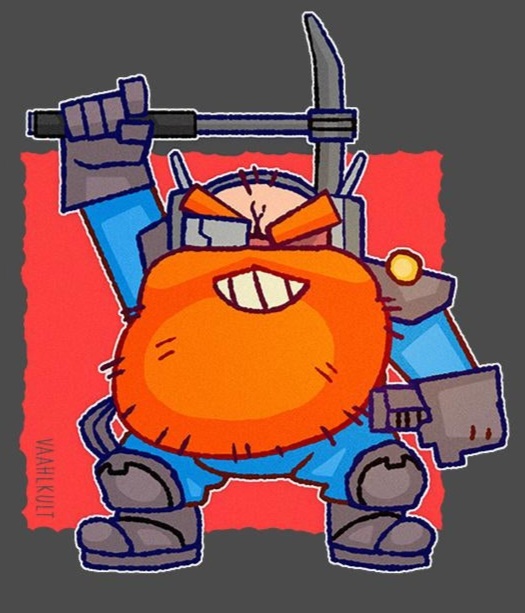My takeaway is that it’s only original Rogue fans that care about the delineation of the terms. Is there a modern (i.e. post 2000s game) that matches the definition of a roguelike as given in the article?
This article doesn’t interpret the Berlin interpretation correctly. The things the article says are “must haves” are actually just “high value factors” as the post says.
This list can be used to determine how roguelike a game is. Missing some points does not mean the game is not a roguelike. Likewise, possessing some points does not mean the game is a roguelike.
So while some of these are deemed important to roguelike, it can be a roguelike without all of those things.
Now personally I think the debate over the genre is silly, and I don’t think the Berlin interpretation is really accurate anymore. But to be fair to it, it does not say a game has to have everything on that list. Spelunky is a roguelike. Idc what anyone says. Just because it isn’t turn/grid based doesn’t mean it isn’t a roguelike. It has most all the other high value factors, and a handful of the low value factors as well.
Sorry, but the people using the original definition are definitely the minority now. It’s just how language evolves, niche terms that get popular get generalized. Developers aren’t misusing the term because original rogue likes are just that popular, they’re misusing the term because the vast majority of their audience misuse the term and couldn’t give less of a shit about the original definition.
The conversation around the two really wears me out. IMO, there’s no need to be so restrictive. We can call them traditional roguelikes, platform roguelikes, whatever, and I think that’s fine. If anything, I think we should have better terminology to differentiate games where the runs are isolated and those where there is meta progression. I don’t think roguelite a good name for the latter.
We can also just call them all rogue-likes. Everyone intuitively understands there’s a huge space in that by now, and the games can wildly differ. It’s fine. We know that no two MMORPGs are alike, and now two rogue-likes are alike.
Sure, that’s fine if people were actually specifying any sort of modifier. But calling everything a roguelike makes it hard to find the traditional roguelikes for those that like them. I’d be ok if the terms were standardized with modifiers like “Traditional Roguelike”, etc, but they aren’t. Everything with permadeath gets the label roguelike these days.
They both have random generation of runs, doesn’t even have to be a dungeon crawler. The only difference is that a roguelite has meta-progression: you in some manner earn resources from each run that allow you to gain advantages on future runs
But does it have to be resources? What about unlocking a new character type, that can use different powers?
New characters are resources too. The word doesn’t have to be limited to spendable currencies like “lumber and gems”.
@Risk It’s a contentious topic. My roguelike podcast cohosts and I devoted almost 2 hours talking about this specifically in a recent episode: https://grogpod.zone/2023-10-11-what-is-a-roguelike/
It’s also worth noting that the definitions have changed over time and will likely continue to do so, as with any evolving genre: https://github.com/ScottBurger/going_rogue_podcast/wiki/What-is-a-roguelike-database
Caves of Qud, Ancient Domains of Mystery, Tales of Maj’Eyal, Cataclysm: Dark Days Ahead, and Dwarf Fortress Adventure Mode are all examples of modern games that meet the definition of a “traditional roguelike” - which is the term Steam uses to categorise games that are actually like Rogue, as opposed to games that just have permadeath and procgen.
However, dorks like the guy who wrote this article need to understand that language evolves. Roguelike doesn’t mean the same thing today as it did 30 years ago. There’s no problem whatsoever with games like Slay the Spire, Dead Souls and FTL being called roguelikes - you can see in an instant that these games don’t meet the definition of the traditional roguelike. The claim that this terminology is confusing or frustrating is just not true.
However, dorks like the guy who wrote this article need to understand that language evolves.
When they tried to call things “Rogue-like-like” is where they lost me.
Removed by mod
Here’s how I understand it:
Rogue-lite: has permanent upgrades that persist between runs.
Rogue-like: each run is unaffected by any previous run.
So basically Kingdom of Loathing is a Roguelite? Neat!
Whoa, what a nostalgia trip to pull out of nowhere lol
It’s actually still going strong! I started playing daily again a couple months ago after being away for years and it totally still holds up!
Dead Cells, as far as I recall. What a f****** awesome game.
Oh, and Hades, except that had a lot of dialogue, which this is saying true roguelikes don’t have. But f*** off, Hades is one of the best games in years.
Definitely Dead Cells covers all of those bullet points in the definition though, and I played that for about as long as I played Hades, 120 plus hours or so.
Hades would be considered Roguelite, doesnt mean its a bad game, its great.
Roguelikes come from the age of boomers and gen x, are hard as nails, very complex, have a cursed tome of documentation and take months to reach victory, if at all.
Roguelites are for the modern times.
Rogue lite: we want to gatekeep this game for not being soop0r hard to play.
Rogue like: gatekeepers approved. Only real gamerz play this game.
I always thought rogue-like games were just stealthy sneak games.








